Car door locks are a fundamental component of vehicle security, ensuring the safety of passengers and protecting the contents of the vehicle. However, like any mechanical or electronic system, car door locks can experience problems over time. In this article, we will explore the most common car door lock problems, with a particular focus on the crucial role of the door lock actuator in these issues.
Before diving into specific problems, it's essential to understand what a door lock actuator is. The door lock actuator is a small motorized device located inside the car door, responsible for locking and unlocking the door when you press the button on your key fob or the door panel. This component is central to the functionality of modern car door locks and is often at the heart of many common car door lock problems.
One of the most prevalent issues is the failure of the door lock actuator. Symptoms of a failing actuator include the inability to lock or unlock the door using the key fob or door controls, strange noises coming from the door when attempting to lock or unlock it, or the door lock behaving erratically. Over time, the motor inside the actuator can wear out or the internal gears can become stripped, leading to malfunction.
Sometimes, the issue may not lie with the door lock actuator but with the key fob itself. A key fob with a dead battery, or one that has become unprogrammed or damaged, can fail to send the necessary signal to the door lock actuator. In such cases, replacing the battery or reprogramming the key fob can often resolve the problem.
Electrical wiring problems can also lead to car door lock failures. The wiring connecting the door lock actuator to the car's central locking system can become frayed, corroded, or disconnected. This interruption in the electrical flow can prevent the actuator from receiving signals, rendering the door lock inoperative.
Inside the door, mechanical linkages connect the door lock actuator to the door latch mechanism. These linkages can become bent, broken, or disconnected, preventing the actuator from physically moving the lock. If you notice that the lock is not engaging or disengaging properly, a problem with these linkages might be the cause.
In colder climates, door locks can freeze, preventing the actuator from moving the lock mechanism. This is often a temporary problem that resolves as the temperature rises, but it can be mitigated with de-icing sprays or lubricants designed for car locks.
The car’s central locking system controls all door lock actuators simultaneously. If this system experiences a malfunction, such as a blown fuse, damaged control module, or software glitch, it can affect the operation of all door locks. Diagnosing and repairing issues with the central locking system often requires professional assistance.
When faced with door lock issues, it's crucial to diagnose whether the door lock actuator is the source of the problem. Here are some steps to help you identify actuator-related issues:

While some door lock problems are inevitable with wear and tear, regular maintenance can help prevent many issues. Here are some tips to keep your door lock actuators and related components in good working condition:
Car door lock problems can be frustrating and compromise your vehicle’s security. Understanding the role of the door lock actuator and other components involved in the locking mechanism can help you diagnose and address these issues effectively. By staying vigilant and performing regular maintenance, you can ensure that your car door locks remain reliable and functional for years to come.
GET A QUOTE